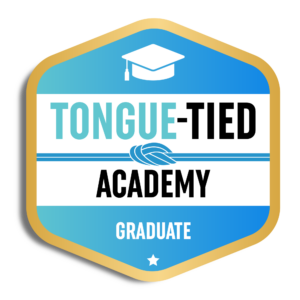What are TOTs?
TOT stands for tethered oral tissues. This is most commonly referred to tongue ties and lip ties.
A tongue tie is where the tongue is tethered to the floor of the mouth too tightly, preventing a proper range of motion of the tongue. Some ties are obvious to spot because the tongue cannot move up, or stick out of the mouth. Some ties are harder to see because the tongue can appear to move a little bit, but not well enough to function properly.
A lip tie is when the lip is tethered to your bone too tightly, causing issues with the lip function, and can even affect your teeth.
How do ties affect infants, children, and adults?
Infants
TOTs in infants affect feeding, breathing, growth and development, and more. When a tongue is tied too tight, the baby cannot latch, suck, or swallow correctly. This causes issues with:
- Inefficient feeding, causing baby to become tired, and frustrated. It's very hard for the baby to vacuum milk out of the nipple or bottle, the harder the work, the more tired they become. Sometimes the baby needs to eat "all day long," because they just are not getting enough milk fast enough. This can create difficulties in gaining weight as well.
- Improper seal on breast or bottle can cause excessive air to be swallowed - creating reflux, gas, or both. Sometimes a baby is said to have "colic," while really it is due gas in their tummy from being unable to create a proper seal around the breast or bottle.
- Pain to mom while breast feeding. This can cause damage to the nipple, and dissuade and discourage mom and baby to continue breast feeding.
- Significant stress to mom because she may feel she is having a very hard time feeding her baby. Stress on mom is also stress on the baby. Stress will negatively affect milk supply as well.


Children
TOTs in children affect many things. The tongue is a key part of many things; speech, eating, breathing, and more. These are some things we see affected by tongue and lip ties:
- Speech issues: When a tongue is tethered too tightly, the tongue is unable to make the proper movements and patterns to produce the proper sounds.
- Breathing issues: When the tongue is held too tightly to the floor of the mouth, the tongue rests low in the mouth, rather than high up, sealed to the roof of your mouth. This can lead to mouth breathing, poor sleep, improper jaw development, and decay. An airway evaluation and possible referral is done in order to manage additional factors impacting your child's breathing and health.
- Growth and development: As a child grows, their jaws depend on the muscles in and outside their mouth to develop properly. This includes the tongue. When the tongue cannot properly rest where it should, it cannot put the correct pressure on the jaws to aid in proper shape development. This can contribute to a narrow upper arch, and a long face. This will also constrict the airway, causing a cascade of other associated issues.
Adults
- Breathing issues: tongues can cause/contribute to mouth breathing, which causes poor breathe quality, poor sleep, sore throats, decay, and other serious issues.
- Speech issues: Some adults do not outgrow their speech impairment from childhood, due to a tongue tie. Therapy and surgical intervention can be very beneficial in correcting speech.
- Head and neck pain, TMJ issues: All muscles are connected by fascia, when there is a restriction, the impacts can be body wide. The tongue is connected to the floor of your mouth, which is connected to your throat, neck and shoulder muscles. Sometimes the tongue tie pulls on these muscles, encouraging forward head posture, causing muscle tension and spasms, and chronic pain.
- Intimacy barriers
Laser Dentistry
Laser dentistry is specific dental procedures performed with a laser. There are many different types of dental lasers, and they are used for various things. At OFD, Dr. Bachelder uses a CO2 laser, which is able to perform special soft tissue procedures. These procedures include tie releases, snore therapy, and more.
Laser assisted uvulopalatoplasty is procedure that can help reduce snoring and improve airflow. This procedure is done by a laser that shrinks excess tissue in back of the roof of the mouth and uvula area. This procedure is often beneficial in patients with sleep apnea, because it helps to open the airway.
The laser can also be used to help deepen your lip pockets to help dentures fit better.
A very popular treatment is cold sore and mouth ulcer laser therapy. Once the site is treated, the lesion will not happen again in the same area.
A diode laser is another special type of laser that is useful in management of some oral ulcers and lesions, gum pockets, and more.

Dr. Mary Bachelder is a graduate of the Tongue-Tied Academy. During this in-depth course, she learned the most up-to-date research, best practices, assessments, and treatments for tongue and lip ties.

Dr. Mary Bachelder is a Light Scalpel doctor! Light Scalpel is a state of the art CO2 laser, which allows Dr. Bachelder to perform laser dentistry with exceptional precision, and optimal outcomes.

